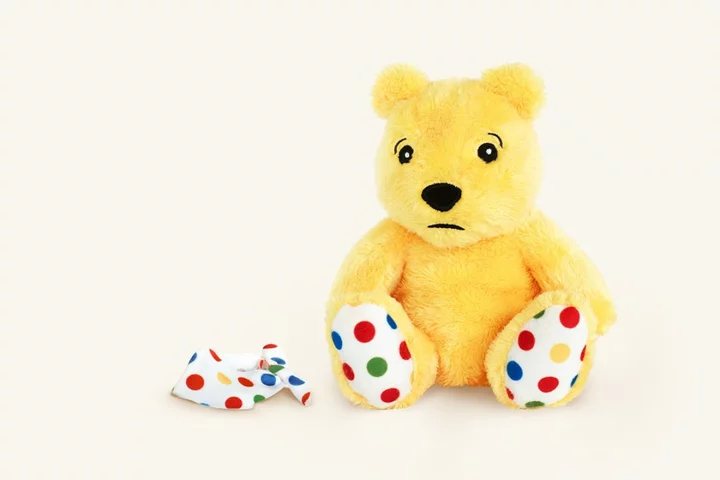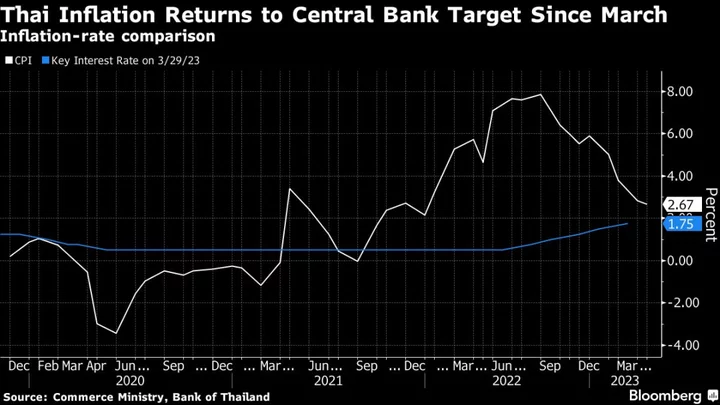
Minor league host families, once a pillar of pro baseball, phased out by new CBA
After decades of supporting poor, young baseball players as they began their professional careers, minor league host families have officially been phased out
2023-05-15 18:53

Children In Need removes Pudsey’s bandana to show not all challenges are visible
BBC Children In Need has launched a new Behind The Bandana campaign to mark Mental Health Awareness Week. The charity has temporarily removed mascot Pudsey’s eye covering to show “not all of the challenges that children and young people may be facing are visible”, the broadcaster said. The campaign encourages conversations between children and parents, carers and other trusted adults “to ensure no child faces their emotional and mental health challenges alone”. Former Love Island contestant Dr Alex George, who has campaigned for better mental health after the death of his 19-year-old brother Llyr by suicide in 2020, has been named Behind The Bandana ambassador. He said: “I know how important early intervention is in helping make a difference to the emotional wellbeing of children and young people and so I am very proud to be the ambassador of such a powerful campaign that really shines a light on the mental health crisis we are facing. “As highlighted by Pudsey bear himself, mental health issues can be less visible on the outside, but conversations and positive relationships really can help.” What’s also clear is that we can all play a role in addressing early signs of worry and anxiety by showing children and young people that we’re here to listen and to support them Simon Antrobus, Children In Need As part of the campaign, Children In Need has released the findings of a new Censuswide survey shedding light on how comfortable children feel when asking for help with their feelings and how often they feel the need to put on their “metaphorical bandana” and hide their emotions. While nine in 10 parents surveyed said they talk to their child about their mental health at least once a month, more than a quarter of young people surveyed said they had not talked to someone they trust about their mental health in the last six months. Children In Need’s boss Simon Antrobus said: “This research is a clear indication that our Behind The Bandana campaign is urgently needed. “What’s also clear is that we can all play a role in addressing early signs of worry and anxiety by showing children and young people that we’re here to listen and to support them. “By recognising and acknowledging that some feelings of worry and anxiety can be hidden means early conversations, sensitively delivered with kindness and empathy, can make a real difference to a child’s wellbeing and can help prevent mental health problems from becoming embedded.” Read More Charity boss speaks out over ‘traumatic’ encounter with royal aide Ukraine war’s heaviest fight rages in east - follow live
2023-05-15 17:21

Is your child too anxious to go to school?
Like adults, it’s normal for kids to have wobbles and worries. But what happens when anxiety becomes an ongoing problem, causing a lot of distress and impacting school attendance? “It is natural for children to not want to go to school from time to time. For example, they might be worried about a test, or a problem with a friend,” says Dr Julia Clements, principal educational psychologist for children’s mental health charity, Place2Be. “With a bit of support, most children will be able to attend school regularly and to not avoid it when things get a bit tricky. However, other children may become so anxious that they start to avoid school all together.” Spotting the signs Remember, children often aren’t able to tell adults when they’re struggling with anxiety. Parents and carers can look out for signs, though. “Anxiety can show up differently in different children. Your child may become tearful or quiet at bedtime, for example, or report feeling so ill they cannot attend school. Alternatively, your child may appear quite angry, argumentative and refuse to get ready for school,” says Clements. Dr Marianne Trent, clinical psychologist and author of The Grief Collective, who previously worked in child and adolescent mental health services (CAMHS), adds: “A child may complain about not wanting to go to school, or that it is boring or that they have tummy ache. They may drag their heels more about leaving the house or walking to school.” Responding with care Showing that you are interested and care about how they’re feeling can be really helpful. Having your support could help alleviate their worries, and hopefully you’ll be able to work through some strategies together. “It is important that parents and carers acknowledge the distress their child is experiencing, and that they are finding going to school a real challenge,” says Clements. “For example, you might say something like, ‘I can see that you are really worried about going to school and that going in will be really hard for you’. “However, it is also important to help your child to ‘face their fears’ and to attend school, despite it being the last thing they feel like doing! Acknowledge that this might be tough, but that you believe in them and will support them to do this difficult thing. Praise and encourage your child for any small steps of progress they are able to make towards attending school regularly.” Trent suggests talking to them about what might have caused their sudden reluctance to attend school: “Asking how they’re feeling and if anything happened the day before which made them feel worried, sad or confused can be a useful first step.” It might be easy for parents and carers to get frustrated and possibly angry if children refuse to go to school. However, this could lead to more distress, so it’s helpful to try and communicate calmly. Trent says: “It’s worth knowing that anger is a secondary emotion, and that this might mask a feeling of not having control, sadness, or even parental anxiety too. “Trying to enter into conversations when both parties are feeling well rested can give the best chance of staying calm. It’s also important that repairing any ruptured relationships is modelled ideally as soon as possible after any harsh or loud words have been spoken,” she adds. Talk to the school If the pattern continues, Trent says: “Arranging a meeting to discuss with the school can be an important step forward. If school attendance drops below a certain percentage, then it may trigger a referral to Child and Adolescent Mental Health services (CAMHS) and/or social care. “If there is a pastoral department in school, then arranging for the child to spend time there doing some 1:1 or group work can be useful. Similarly, liaising with mental health and support services for therapy or support can be transformational too.” Your GP can help advise on mental health support, and some schools may also have counselling services in place. However, Clements says there may be various ways school staff can potentially help – simple adjustments that could make a big difference: “For example, your child may like to be met at the gate, or being given a special job to do in the morning.” Is there anything else going on? It’s important to consider whether other factors could be coming into play, which may require additional attention and support. Clements says: “Do make sure that your child is safe from harm at school – for example, their avoidance of school is not due to them being bullied. If your child is avoiding school because of their neurodivergence or additional needs, then liaise with the SENCO (special educational needs co-ordinator) to make sure that reasonable adjustments are being made.” Read More Charity boss speaks out over ‘traumatic’ encounter with royal aide Ukraine war’s heaviest fight rages in east - follow live Could talking to toddlers be the key to early brain development? What’s the link between the menopause and anxiety? How to encourage green-fingered kids
2023-05-15 16:26

Could talking to toddlers be the key to early brain development?
Talking to toddlers can help advance early brain development, scientists have found. Researchers from the University of East Anglia (UEA) discovered that two-and-a-half-year-olds who heard more speech in everyday life had more myelin – a substance that makes brain signals more efficient – in language-related areas of their brains. The researchers said their findings, published in the Journal of Neuroscience, demonstrate how talking to toddlers can shape their developing brain. Lead researcher Prof John Spencer, from UEA’s School of Psychology, said: “We know that children’s brains develop very rapidly in the first two years of life, with brain volume at about 80% that of an adult brain by the age of two. The message to caregivers is clear - talk to your baby, your toddler, your child. Not only are they listening, but your language input is literally shaping their brains Prof John Spencer “Myelin is made up of protein and fatty substances and forms an insulating layer around nerves in the brain.” He added: “Imagine you have a hosepipe with lots of holes in it. “Myelin is like wrapping the hosepipe with duct tape – it insulates neural fibres, bringing more of the ‘signal’ from one brain area to the next.” For the study, the researchers gave 163 babies and toddlers small recording devices to wear for three days. They analysed just over 6,000 hours of language data in total, which included words spoken by the children as well as speech from adults. When the children were asleep, the researchers carefully placed them in an MRI scanner to measure myelin in their brains. Prof Spencer said: “What we found is that the toddlers who heard more speech in their everyday environment also had more myelin, which is likely to support more sophisticated language processing. “In other words – talking to your kids is very important in early development as it helps to shape the brain.” The researchers said their study is one of the first to show that listening to speech is associated with brain structure early in development. Prof Spencer said: “Prior work showed a similar association in four to six-year-olds, but our findings push this association much earlier in development. “Indeed, we even found associations between language input and brain structure in six-month-old infants.” He added: “Although there is still much more to learn about these processes, the message to caregivers is clear – talk to your baby, your toddler, your child. “Not only are they listening, but your language input is literally shaping their brains.” Read More Charity boss speaks out over ‘traumatic’ encounter with royal aide Ukraine war’s heaviest fight rages in east - follow live Is your child too anxious to go to school? What’s the link between the menopause and anxiety? How to encourage green-fingered kids
2023-05-15 16:16

Controversial jewelry collection fetches a record-shattering $196 million
Jewels owned by the late billionaire Heidi Horten, whose first husband purchased Jewish businesses sold under duress during the Nazi era, fetched a combined $196 million.
2023-05-15 15:59

What’s the link between the menopause and anxiety?
Hot flushes and night sweats are commonly associated with the menopause – but the vast majority of menopausal women also suffer from mood and emotional problems, such as stress and anxiety. Research recently carried out by GP and menopause specialist Dr Louise Newson, founder of Balance Menopause, found 95% of nearly 6,000 perimenopausal and menopausal women had experienced a negative change in their mood and emotions during the menopause, with stress and anxiety being the most common psychological symptoms. Speaking to mark Mental Health Awareness Week (May 15-21), Newson says: “Because we often frame the menopause in terms of physical symptoms, such as hot flushes and night sweats, psychological symptoms, such as anxiety and depression, can go under the radar. “Every year I see hundreds of women struggling with menopause, and thousands more reach out on social media, looking for advice on symptoms that can impact relationships, social lives, confidence and careers.” Here, Newson, and other menopause and anxiety experts, discuss the link between the menopause and anxiety, and how to deal with it… What causes anxiety during the menopause? Low mood and anxiety can be common features of the perimenopause and menopause due to fluctuating and falling hormones, says Newson. “When oestrogen falls, levels of the mood-boosting hormone serotonin fall, too, while cortisol (the primary stress hormone) rises,” she explains. “In addition, the knock-on effects of physical symptoms, such as fatigue, hot flushes and aches and pains, can affect mood and self-esteem.” How common is menopausal anxiety? Newson’s research shows most women (95%) have some sort of mood dip during the menopausal period. Indeed, Dave Smithson, operations director at Anxiety UK, suggests anxiety is one of the key symptoms, if not the main symptom, affecting women during the perimenopause and menopause. “Often anxiety fails to receive the attention it warrants as a symptom of the menopause among the medical profession and indeed the public, which is concerning given the profound impact it can have,” he stresses. Who is likely to suffer from anxiety during the menopause?Sexual and reproductive health consultant Dr Paula Briggs, chair of the British Menopause Society, says the menopausal period has been described as a ‘window of vulnerability’, explaining: “Some women experience anxiety and low mood or depression in addition to other better-recognised menopausal symptoms. Sometimes these symptoms occur in isolation and the link with menopause may be less clear. “Mood-related changes are more likely in women who’ve had previous mental health problems, and in women experiencing surgical menopause [removal of the ovaries and or womb].” Can you get menopausal anxiety when you’ve never been anxious before? Anxiety caused by the menopause can strike women who’ve never had an anxiety problem before, Smithson points out. “Many women report new-onset anxiety, having never previously experienced anxiety at a level that it could be termed an anxiety disorder,” he says. “Others report a worsening of their pre-existing anxiety condition, as a result of the menopause.” “For women who’ve lived with anxiety for many years, when the menopause hits, they may report finding their anxiety has taken on a whole new identity, becoming more severe, intense, frequent or disabling, and consequently very challenging to manage.” What are menopausal anxiety symptoms? Although there are different types of anxiety, the symptoms tend to be the same irrespective of the underlying cause, explains Briggs. She says they can include feeling tense and nervous, being unable to relax, having difficulty concentrating, feelings of panic and dread, being unable to cope with normal daily activities, being overwhelmed, self-consciousness, and feelings of weakness and fatigue. Physical signs of anxiety include sweating, trembling, rapid heart rate and hyperventilation. “Where there’s no history of mental health problems and the symptoms and signs coincide with the menopause, they are more likely to be related to hormonal variability,” she says. “If there’s a background of anxiety and depression, then the symptoms and signs might be exacerbated by the menopause.” How is menopausal anxiety treated? Smithson says there’s still a taboo around the subject of anxiety, although he admits “great strides” towards breaking it have been made recently. “That said, access to support and treatment remain patchy, with many women left to cope alone and battle on through what can be one of the trickiest phases of their life. “Anxiety is both treatable and manageable and we would urge any women experiencing new-onset anxiety or worsening of pre-existing anxiety to seek support.” Briggs and Newson say HRT, if appropriate, is often the first treatment for menopausal anxiety, although Newson stresses: “HRT is the first-line treatment for all menopause symptoms, including mood-related symptoms. But the first piece of advice I give to any woman struggling with her mental health is to see a healthcare professional to discuss treatment options.” She suggests recording symptoms on the free balance menopause support app symptom tracker. Briggs says if necessary, antidepressant medication can improve outcomes, and talking therapies, such as CBT (cognitive behavioural therapy), are also important to help manage anxiety and depression, irrespective of the underlying trigger. “Some women, particularly those who respond partially to HRT, may need to consider adding an antidepressant, specifically one recognised to help with anxiety,” she says. However, Newson warns: “Often women are incorrectly prescribed antidepressants for menopause-related low mood and anxiety, but these mood changes are very different to clinical depression.” Can lifestyle changes help? The experts stress healthy lifestyles can really help improve anxiety symptoms, and Newson advises: “Beyond HRT, it’s so important to optimise your exercise and nutrition. A balanced diet with lots of fresh fruit and vegetables can help regulate your mood, and watch your alcohol and caffeine intake, as both can increase anxiety. “Regular exercise will lift your mood, and help you sleep, as anxiety can be a real barrier to a good night’s sleep.” She says studies suggest mindfulness can help with symptoms of anxiety and depression in menopausal women, and stresses: “Find time to focus on yourself and find some coping mechanisms you can turn to when you need them. If talking to a good friend helps with anxiety, give them a call. I find writing lots of lists helps me feel in control and calmer.” And Briggs adds: “Many women have unrealistic expectations about HRT, and it’s important to stress that lifestyle management is also an important aspect of managing the menopause, along with considering things such as cognitive behavioural therapy, hypnotherapy and mindfulness.” Read More Charity boss speaks out over ‘traumatic’ encounter with royal aide Ukraine war’s heaviest fight rages in east - follow live How to encourage green-fingered kids Cost of sunscreen could be increasing risk of skin cancer, charity suggests Ukraine Eurovision winners Kalush Orchestra invite Princess Kate to join them on tour
2023-05-15 15:59

J-Pop Talent Agency Apologizes for Founder’s Alleged Sex Abuse of Stars
Japanese talent agency Johnny & Associates Inc. issued an apology in response to allegations that founder Johnny Kitagawa
2023-05-15 15:50

Cost of sunscreen could be increasing risk of skin cancer, charity suggests
The cost of sunscreen could be contributing to the rise in skin cancer cases in the UK, a charity suggests. A survey from Melanoma Focus found that 50% of people think sunblock is too expensive, with 67% saying they would use it more if it was cheaper and 10% saying they don’t use it at all because of the cost. The survey also found that most British people (58%) can’t identify all the signs of melanoma skin cancer. Melanoma Focus is calling for the government to cut VAT on high-factor sunscreens to reduce the cost and make them more accessible to everyone. Melanoma is a deadly form of skin cancer and the vast majority of cases (86%) are preventable. There are around 16,700 new melanoma skin cancer cases in the UK every year, according to Cancer Research UK. Over the last decade, incidence rates have increased by 32%, and are projected to rise by another 9% by 2040. Around 4,000 cases of melanoma in England are linked with lower deprivation. “Melanoma is the fifth most common cancer in the UK and the deadliest form of skin cancer,” said Susanna Daniels, CEO of Melanoma Focus. “Wearing a high SPF sunscreen is a hugely important safety measure for protecting against it. “We know that people are experiencing increasing pressures on their finances at the moment but, with skin cancer rates on the rise, the use of sunscreen should be a high priority.” Removing VAT on sun protection products would be “a cost-effective way to cut the overall incidence of skin cancer and could help save lives”, she added. Michelle Richardson, 49, from Petersfield, Hampshire, was diagnosed with melanoma in 2018 after noticing an itchy mole on her back. She had an operation to remove the mole, but 18 months later a scan found the melanoma had spread throughout her body including in her spine, lungs, spleen and brain. “I had immunotherapy treatment for two years and I’m currently in remission and hope it stays that way for as long as possible,” Richardson says. “Sunscreen shouldn’t be a luxury product. It’s essential for protecting the health of the nation so I’m fully supportive of the proposed cut to VAT. “Treatment for melanoma costs the NHS a fortune, so a VAT cut to the thing that can prevent it happening in the first place makes sense financially as well as morally.” MP Amy Callaghan, who is supporting the campaign, said: “More people wearing sunscreen means fewer people getting melanoma. “But when 52% of people in my constituency can’t afford to turn on the heating, it’s unlikely they’ll take on extra expenses like sunscreen. “That’s why we must make sunscreen more affordable by removing VAT.” Melanoma Focus also wants to raise awareness about the early signs of skin cancer. “We’d also urge people to make themselves aware of melanoma symptoms and seek medical help if they notice anything suspicious, particularly any changes to a mole or lesion,” Daniels said. “Early detection leads to a higher cure rate and more treatment options.” Read More Charity boss speaks out over ‘traumatic’ encounter with royal aide Ukraine war’s heaviest fight rages in east - follow live Ukraine Eurovision winners Kalush Orchestra invite Princess Kate to join them on tour ‘Simply no evidence’ for many Mirror phone hacking claims, Prince Harry trial told As Coronation Street puts the spotlight on sepsis, the signs and symptoms to know
2023-05-15 14:49

How to make TikTok’s viral whole roasted cauliflower
National Vegetarian Week kicks off 15 May, which provides a great opportunity to get creative in the kitchen. Vegetarians, vegans and people who are just looking to cut down on their meat consumption are always looking for great alternatives for classic dishes such as steak or a classic sunday roast. Enter: the roasted cauliflower. Often seen as a mere side, this viral clip featuring a whole roasted cauliflower with a garlic yoghurt and drizzled with tahini and a chimichurri style sauce, has gone viral, with over 1.7 million views and 108,000 likes. Luckily, we’ve sat down with the creator of this viral clip, professional chef and host of foodie favourite the Desert Island Dishes podcast Margie Nomura, who has shared this delicious recipe so you can impress all your friends this National Vegetarian Week and beyond. “This dish is a perfect centrepiece for any vegetarian meal,” says Nomura. “It’s a great substitute for a cut of meat and is easy to make when you’re feeling lazy. “When you roast a cauliflower whole it takes on this buttery, sweet but salty crust in the oven so make sure you roast it until it is soft enough for a knife to cut through. “For the chimichurri, you won’t use all of this for the cauliflower but it keeps beautifully in the fridge for up to two weeks and is amazing served as a salad dressing or on vegetable kebabs.” Roasted cauliflower Ingredients: 1 medium-sized cauliflower (remove thick ugly outer leaves but leave any smaller more delicate ones) 2 tbsp olive oil 1 tsp Maldon sea salt For the chimichurri: Mix together: 1 finely diced shallot 1 diced red chilli pepper 3-4 diced garlic cloves ½ cup red wine vinegar 1 tsp salt 1 tsp red pepper flakes ½ cup finely chopped coriander 2 cups finely parsley ¾ cup extra-virgin olive oil (more oil as needed to get the right consistency – it should be runnier than a pesto, more like a heavily flavoured chunky oil) For the garlic yoghurt: 4 heaped tablespoons of Greek yoghurt 1 clove garlic crushed Juice of ¼ lemon 2 tbsp tahini to serve Method: @desertislanddishes Whole roasted cauliflower served on garlicky yoghurt, drizzled with tahini and a chimichurri style sauce. It’s SO GOOD. The cauliflower is like butter, you could cut it with a spoon. #cauliflower #tahini #easyentertaining ♬ Jazz masterpiece "As time goes by" covered by a Jazz violinist by profession(962408) - ricca Pre-heat the oven to 200C. Fill a large pot of water and season well with salt and bring to a boil. Place the cauliflower in, cover and let cook for 6-8 minutes, depending on the size. Check to see if ready by poking the stem with a knife, and then remove the cauliflower and place it on a sheet tray to steam dry for around 10 minutes. Cover with extra virgin olive oil and season well with sea salt. Return to the oven and let roast for 45 minutes until charred and golden all over. Remove from the oven. Spoon some garlicky yoghurt onto a serving plate and pop the cauliflower on top. Drizzle with tahini and chimichurri. Cut into wedges and enjoy! Read More What is coronation chicken? The story of the royal recipe and how to make it Healthy lemony smoked salmon pasta that takes zero effort Easy coronation chicken pie recipe chosen by Mary Berry Andi Oliver on turning 60 and channeling her anger into power Andi Oliver: Earl Grey tea bags are a gamechanger for barbecue chicken Caribbean-inspired coconut and lime cheesecake
2023-05-15 14:20

Baby talk: Talking to toddlers boost early brain development, study finds
The more you talk to a toddler, the more it helps their brains to develop in early childhood, a study has found. Researchers discovered that two-and-a-half-year-olds who heard more speech in everyday life had more myelin in language-related areas of their brains. Myelin is a material produced by the body that forms around nerves, including those in the brain, that allows electrical impulses to transmit quickly and efficiently. Scientists from the University of East Anglia said their findings demonstrate how speaking to toddlers can shape their developing brains. The study, published in the Journal of Neuroscience, involved 163 babies and toddlers being given small recording devices to wear for three days. Researchers analysed just over 6,000 hours of language data in total, including words spoken by the children and speech from adults. When the children were asleep, they were carefully placed in an MRI scanner to measure myelin in their brains. The researchers found that toddlers who heard more speech everyday had more myelin, which they said is “likely to support more sophisticated language processing”. Lead researcher Prof John Spencer, from UEA’s School of Psychology, said: “We know that children’s brains develop very rapidly in the first two years of life, with brain volume at about 80 per cent that of an adult brain by the age of two. “Myelin is made up of protein and fatty substances and forms an insulating layer around nerves in the brain.” He added: “Imagine you have a hosepipe with lots of holes in it. “Myelin is like wrapping the hosepipe with duct tape – it insulates neural fibres, bringing more of the ‘signal’ from one brain area to the next.” The researchers said their study is one of the first to show that listening to speech is associated with brain structure early in development. Prof Spencer said: “Prior work showed a similar association in four to six-year-olds, but our findings push this association much earlier in development. Indeed, we even found associations between language input and brain structure in six-month-old infants.” He added: “Although there is still much more to learn about these processes, the message to caregivers is clear – talk to your baby, your toddler, your child. “Not only are they listening, but your language input is literally shaping their brains.” Additional reporting by PA Read More Rihanna and A$AP Rocky celebrate son’s first birthday ‘I don’t get angry’: Pierce Brosnan says meditation is key to managing anger TikTok Tattoogate: How a tattoo artist sparked backlash for ‘absurd’ pricing and design changes Dean Gaffney says I’m A Celebrity ‘saved his life’ after bowel cancer scare Talented boxer reveals first sign of brain tumour after collapsing at service station GB News in ‘significant breach’ of Ofcom rules over Covid vaccine claims
2023-05-15 13:45

Thai Central Banker Signals More Hikes to Win Inflation Fight
Bank of Thailand Governor Sethaput Suthiwartnarueput signaled that the central bank will stick to its gradual and measured
2023-05-15 12:48

Kehinde Wiley is taking his art everywhere, all at once
Kehinde Wiley wonders aloud if he’ll ever reach a career moment of such import and gravity as his famous 2018 portrait of Barack Obama, which has drawn crowds around the United States
2023-05-15 12:45
